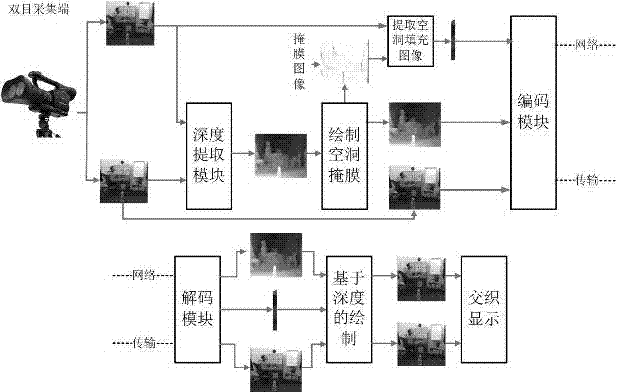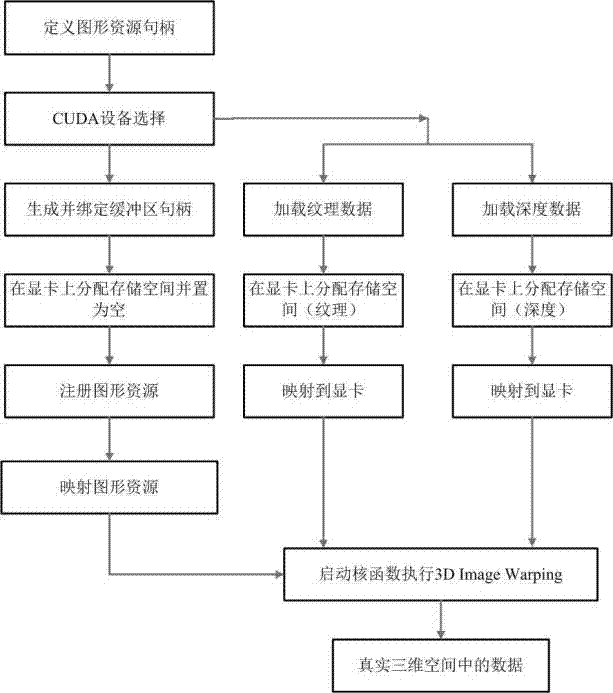Real-time rendering method based on GPU (Graphics Processing Unit) in binocular system
A real-time rendering, dual-purpose technology, applied in 3D image processing, image data processing, instruments, etc., can solve problems such as high algorithm complexity, bandwidth consumption, and difficulty in applying 3DTV systems
- Summary
- Abstract
- Description
- Claims
- Application Information
AI Technical Summary
Problems solved by technology
Method used
Image
Examples
Embodiment 1
[0028] Referring to Figure 1, the GPU-based real-time rendering method in this binocular system is characterized in that firstly, the hole mask image is drawn at the sending end of the binocular system and the texture information HFI of the large hole is extracted, and then the texture information HFI of the large hole is extracted, and then used at the receiving end of the system to extract HFI fills large holes, and uses interpolation algorithm to fill small holes; in order to meet real-time requirements, GPU is used to accelerate the drawing of virtual viewpoint images; firstly, CUDA technology is used to project pixels in texture images to three-dimensional space, and then Open GL technology is applied Project the pixels in the three-dimensional space to the two-dimensional plane to complete the drawing of the virtual viewpoint image; the steps are:
[0029] (1) The sending end draws the hole mask image and extracts the texture information: draws the hole mask image, uses t...
Embodiment 2
[0033] This example is basically the same as Example 1, and the special features are as follows:
[0034] The specific steps of the step (1) that the sending end draws the hole mask image and extracts the texture information are as follows:
[0035] ① Use the depth image and its corresponding vertex index to perform three-dimensional image transformation. After the transformation, the color buffer is assigned with 0 and 255 respectively, where 0 represents the hole area and 255 represents the non-hole area. According to the storage characteristics of Open GL, the vertex index of the image, the color data of the vertex and the depth information of the vertex are stored in the vertex buffer, the color buffer and the depth buffer respectively; and the hole mask is an image that plays a marking role. It only records the position of the hole without considering the corresponding color data;
[0036] ② Use the hole mask image to find the maximum horizontal value of the large hole, ...
PUM
 Login to View More
Login to View More Abstract
Description
Claims
Application Information
 Login to View More
Login to View More - R&D
- Intellectual Property
- Life Sciences
- Materials
- Tech Scout
- Unparalleled Data Quality
- Higher Quality Content
- 60% Fewer Hallucinations
Browse by: Latest US Patents, China's latest patents, Technical Efficacy Thesaurus, Application Domain, Technology Topic, Popular Technical Reports.
© 2025 PatSnap. All rights reserved.Legal|Privacy policy|Modern Slavery Act Transparency Statement|Sitemap|About US| Contact US: help@patsnap.com



